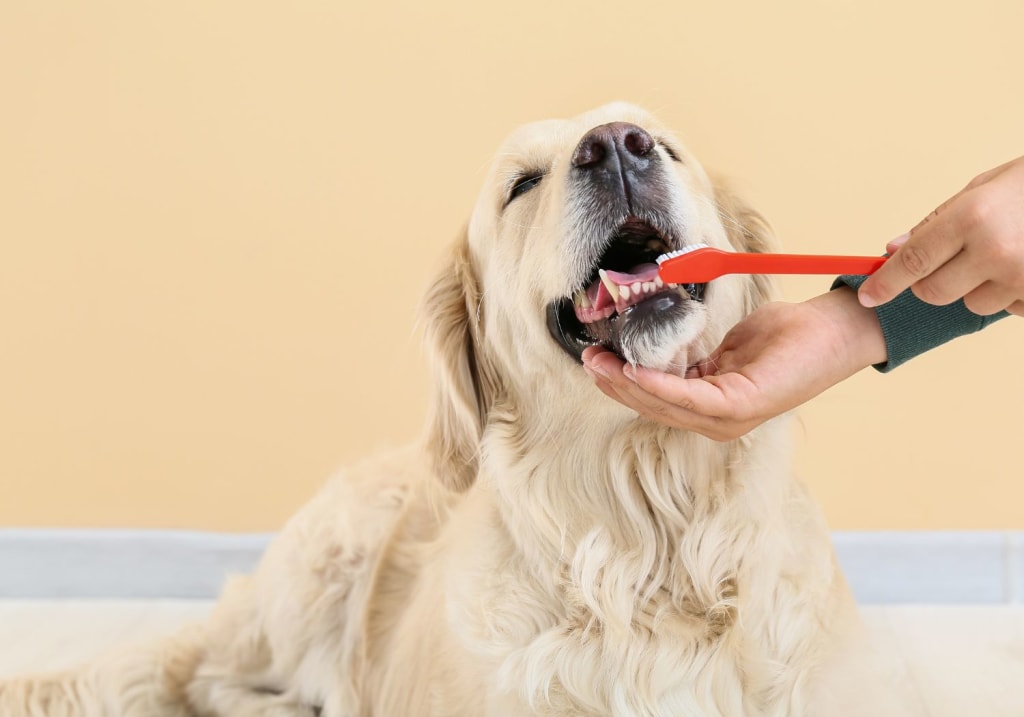Understanding the importance of dental care for dogs
The Importent Guide

Maintaining Your Canine's Oral Health for a Happier, Healthier Pup
As a devoted dog owner, you undoubtedly cherish your furry companion and want to ensure their overall well-being. While grooming, exercise, and a balanced diet are essential aspects of canine care, one crucial element that is often overlooked is dental health. Just like humans, dogs require regular dental care to maintain a healthy mouth and prevent a host of potential issues.
In this comprehensive blog post, we will delve into the importance of dental care for dogs, explore common dental problems, and provide practical tips to help you keep your canine's teeth and gums in top condition. By the end, you'll be equipped with the knowledge to proactively address your dog's oral health and ensure they enjoy a lifetime of happy, healthy smiles.
The Significance of Dental Care for Dogs
Dogs' dental health is often an overlooked aspect of their overall well-being, but it plays a crucial role in their overall health and quality of life. Neglecting your dog's dental care can lead to a range of problems, from bad breath and discomfort to more serious issues like tooth loss, gum disease, and even systemic infections.
Preventing Dental Disease
One of the primary reasons dental care is so important for dogs is to prevent the development of dental disease. Plaque and tartar buildup can lead to gingivitis, a condition characterized by inflamed and bleeding gums. If left untreated, gingivitis can progress to periodontitis, a more severe form of gum disease that can cause tooth loss and even spread infection to other parts of the body.
Periodontal disease is a common problem in dogs, with studies showing that up to 80% of dogs over the age of 3 have some form of the condition. This alarming statistic highlights the importance of proactive dental care to maintain your dog's oral health and prevent the onset of this debilitating disease.
Maintaining Overall Health
The connection between dental health and overall health is well-established in both humans and dogs. Poor oral hygiene can lead to the accumulation of harmful bacteria in the mouth, which can then enter the bloodstream and spread to other organs, potentially causing serious health issues.
Conditions such as heart disease, kidney disease, and liver disease have all been linked to poor dental health in dogs. By prioritizing your dog's dental care, you can help prevent these systemic infections and maintain their overall well-being.
Improving Quality of Life
Dental problems can cause significant discomfort and pain for dogs, which can negatively impact their quality of life. Dogs with dental issues may experience difficulty eating, reluctance to play, and even behavioral changes due to the discomfort they're experiencing.
Addressing dental problems promptly can alleviate your dog's pain and discomfort, allowing them to enjoy their daily activities and interactions with you and your family. A healthy, pain-free mouth can contribute to a happier, more active, and more affectionate canine companion.
Common Dental Problems in Dogs
To better understand the importance of dental care for dogs, it's essential to be aware of the most common dental problems they may face. By familiarizing yourself with these issues, you can be proactive in addressing them and maintaining your dog's oral health.
Plaque and Tartar Buildup
Plaque is a sticky film of bacteria that forms on the surface of teeth. If left unchecked, plaque can harden into tartar, a hard, calcified deposit that can only be removed by professional cleaning. Tartar buildup can lead to gum inflammation, tooth decay, and the development of periodontal disease.
Gingivitis
Gingivitis is the inflammation of the gums, often caused by the buildup of plaque and tartar. Symptoms of gingivitis include red, swollen, and bleeding gums. If left untreated, gingivitis can progress to the more severe form of gum disease, periodontitis.
Periodontitis
Periodontitis is a serious form of gum disease that can cause the destruction of the tissues and bone that support the teeth. This can lead to tooth loss and the spread of infection to other parts of the body. Symptoms of periodontitis include receding gums, loose teeth, and bad breath.
Tooth Decay and Cavities
While less common in dogs than in humans, tooth decay and cavities can still occur in canines. These issues are typically caused by a combination of poor dental hygiene, a diet high in sugary or starchy foods, and the presence of harmful bacteria in the mouth.
Oral Tumors and Growths
Dogs can develop various types of oral tumors and growths, including benign growths, such as epulides, and malignant cancers, such as oral melanoma. These growths can cause discomfort, difficulty eating, and other health problems if left untreated.
Preventive Measures for Canine Dental Health
Maintaining your dog's dental health is an ongoing process, but with the right preventive measures, you can significantly reduce the risk of dental problems and keep your furry friend's mouth healthy. Here are some key steps to incorporate into your dog's dental care routine:
Regular Dental Cleanings
Professional dental cleanings by a veterinarian or certified veterinary technician are essential for maintaining your dog's oral health. These cleanings typically involve scaling to remove plaque and tartar, polishing to smooth the tooth surfaces, and a thorough examination to identify any underlying issues.
The frequency of these cleanings will depend on your dog's individual needs, but most veterinarians recommend annual or biannual cleanings, starting as early as 1 year of age.
Home Dental Care
In addition to professional cleanings, it's crucial to establish a regular home dental care routine for your dog. This includes:
Tooth Brushing
Brushing your dog's teeth on a regular basis (ideally daily) is one of the most effective ways to remove plaque and prevent the buildup of tartar. Use a soft-bristled toothbrush and dog-safe toothpaste to gently clean their teeth and gums.
Dental Chews and Treats
Providing your dog with dental chews and treats can help remove plaque and tartar, as well as massage the gums. Look for products that have the Veterinary Oral Health Council (VOHC) seal of approval, indicating they have been proven effective.
Water Additives
Adding a dental water additive to your dog's drinking water can help reduce the formation of plaque and tartar. These products contain ingredients that help inhibit bacterial growth and promote a healthier oral environment.
Dietary Considerations
The food your dog eats can also play a role in their dental health. Dry kibble and crunchy treats can help scrape away plaque and tartar, while soft, wet foods may contribute to a buildup of debris. Consult your veterinarian to ensure your dog's diet is optimized for their dental well-being.
Regular Veterinary Checkups
Routine veterinary checkups, including dental examinations, are crucial for identifying and addressing any dental problems early on. Your veterinarian can provide personalized recommendations for your dog's dental care and recommend any necessary treatments or procedures.
Addressing Dental Problems in Dogs
Despite your best efforts, your dog may still develop dental problems. When this occurs, it's essential to act quickly to address the issue and prevent it from worsening. Here are some common dental problems and how to manage them:
Gingivitis and Periodontal Disease
If your dog is diagnosed with gingivitis or periodontal disease, your veterinarian may recommend a professional dental cleaning to remove plaque and tartar buildup. They may also prescribe antibiotics or anti-inflammatory medications to help reduce inflammation and infection.
In more severe cases, your dog may require additional treatments, such as tooth extractions or deep cleaning procedures to address the underlying issues.
Tooth Decay and Cavities
Tooth decay and cavities in dogs are less common but can still occur. Your veterinarian may recommend a dental filling or crown to restore the affected tooth and prevent further damage.
Oral Tumors and Growths
If your dog develops an oral tumor or growth, your veterinarian will likely recommend a biopsy to determine the nature of the growth. Depending on the diagnosis, treatment may involve surgical removal, radiation therapy, or other appropriate measures.
Pain Management
Dental problems can be extremely painful for dogs, and it's essential to address their discomfort. Your veterinarian may prescribe pain medication or recommend other pain management strategies to keep your dog comfortable during the treatment and recovery process.
The Importance of Early Intervention
Addressing dental problems in dogs early on is crucial for their overall health and well-being. Neglecting dental care can lead to more severe issues, such as tooth loss, systemic infections, and even life-threatening complications.
By being proactive and incorporating regular dental care into your dog's routine, you can help prevent the development of these problems and ensure your furry friend enjoys a lifetime of happy, healthy smiles.
Remember, your dog's dental health is just as important as their physical health, and it's your responsibility as a pet owner to ensure they receive the care they need. With the right approach and a commitment to your dog's oral hygiene, you can help them maintain a healthy, pain-free mouth and a high quality of life.
About the Creator
Hasan
Welcome...
In this site of mine you can learn amazing things and many information that you don't know so please subscribe to my site.
Enjoyed the story? Support the Creator.
Subscribe for free to receive all their stories in your feed. You could also pledge your support or give them a one-off tip, letting them know you appreciate their work.






Comments
There are no comments for this story
Be the first to respond and start the conversation.